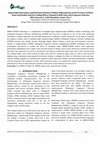Volume 1, Issue 1 by Offia Innocent.S, Udeh Ikemefuna James, Eke J

MIMO-OFDM technology is a combination of multiple-input multiple-output (MIMO) wireless technolog... more MIMO-OFDM technology is a combination of multiple-input multiple-output (MIMO) wireless technology with orthogonal frequency division multiplexing (OFDM) that has been recognized as one of the most promising techniques to support high data rate and high performance in different channel conditions. In this paper we analyze the impacts of phase noise to multiple-input multiple-output (MIMO) orthogonal frequency division multiplexing (OFDM) systems over doubly selective Rayleigh fading. Where channel is both time and frequency selective. Similar to single-antenna OFDM, Orthogonal frequency division multiplexing (OFDM) techniques have been investigated extensively to combat the effect of multipath delay. MIMO-OFDM suffers from significant performance degradation due to phase noise and time-selective fading, which causes intercarrier interference (ICI). We derive the expressions of carrier to interference and signal to interference plus noise ratios. After characterizing the common phase error (CPE) caused by phase noise and ICI caused by phase noise, as well as time-selective fading, using a minimum mean-squared error-based scheme to mitigate the effect of both phase noise and time-selective fading. Equally we evaluated and compared various detection schemes and their performances combined with the proposed CPE mitigation scheme. With numerical results, we examined the relative performances and the potential error floors of these detection schemes which show a total reduction of noise to 5%.
Multiple-input multiple-output (MIMO) antennas combined with orthogonal frequency division multip... more Multiple-input multiple-output (MIMO) antennas combined with orthogonal frequency division multiplexing (OFDM) has been investigated and proofed to robost very attractive for high-data-rate transmission communications. It has also been noted that, MIMO-OFDM systems are very vulnerable to time selective fading as channel time-variation destroys the orthogonality among subchannels, causing inter-carrier interference (ICI). Here, we apply frequency-domain correlative coding in MIMO-OFDM systems over frequency-selective, fastfading channels to reduce ICI. We derive the analytical expression of the carrier-to-interference ratio (CIR) to quantify the effect of time-selective fading and demonstrate the effectiveness of correlative coding in mitigating ICI in MIMO-OFDM systems which was redused up to the lowest level of 8%.

Uploads
Volume 1, Issue 1 by Offia Innocent.S, Udeh Ikemefuna James, Eke J